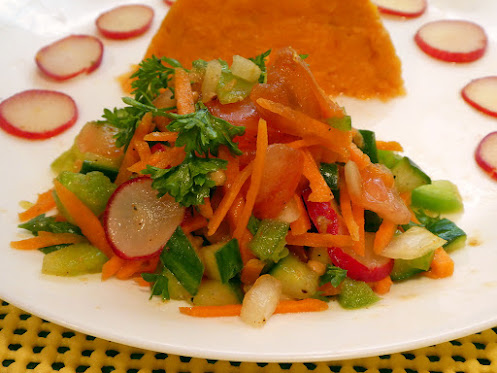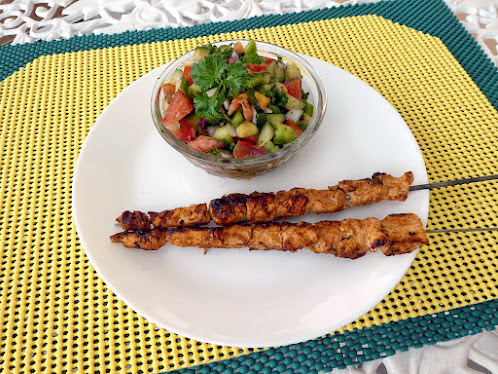Seasonal Salads Around the World 2025
2.2.5 Middle East: Egypt, Turkey, Iran
2025/04/09
In Search Of World's Hidden Tastes
2.2.5 Around The Middle East,
Explore Seasonal Salads
As a crossroad between Europe, North Africa, and Asia, the middle East has been a hub of food and recipe exchange. During the first Persian Empire (ca. 550–330 BCE), the foundation was laid for modern Middle-Eastern food when rice, poultry and fruits were incorporated into the local diet. Figs, dates and nuts were brought by merchants to conquered lands, and spices were brought from the Orient. The region was also influenced by turmeric and other spices from India; cloves, peppercorns and allspice from the Spice Islands; okra from Africa, and tomatoes from the New World.
One should choose food to eat according to the seasons. Food is seasonal whereas salad is also seasonal.
From 525 to 404 BC, Egypt was ruled by the Achaemenid Persian Empire while maintaining some Egyptian customs and positions.
Egypt and Turkey are bound by strong religious, cultural and historical ties. For roughly three centuries, from 1517 to 1914, Egypt was part of the Ottoman Empire, whose capital was Istanbul in modern-day Turkey. Prior to that both modern-day Egypt & Turkey were part of the Roman Empire which covered the territories of both modern-day states.
The Ottomans in particular were very heavily influenced by Persian culture. This legacy has persisted in modern Turkish culture.
Iran and Turkey are perceived as mutually interdependent due to geographical proximity (Iran–Turkey border) as well as historically shared cultural, linguistic, and ethnic traits.
The Ottomans in particular were very heavily influenced by Persian culture. This legacy has persisted in modern Turkish culture.
Iran and Turkey are perceived as mutually interdependent due to geographical proximity (Iran–Turkey border) as well as historically shared cultural, linguistic, and ethnic traits.
Now we depart for Egypt, Turkey, and Iran, explore their seasonal salads sharing with everyone.
Egyptian Salata Baladi
Salata Baladi holds a special place in Egyptian cuisine, embodying centuries of culinary heritage. Its roots trace back to the fertile lands of Egypt, where fresh produce thrived along the Nile River. The term “Baladi” translates to “local” or “traditional,” reflecting the salad’s deeply ingrained presence in Egyptian culture.
At its core, Salata Baladi is a celebration of simplicity and freshness. The star ingredients typically include ripe tomatos, crisp cucumbers, crunchy onions, and vibrant parsley. These elements come together to create a symphony of flavors, enhanced by a zesty dressing of lemon juice, olive oil, salt, and pepper.
Salata Baladi is the National Salad of Egypt. It is an authentic salad that served by almost every kebab restaurants and street food stalls in the capital Cairo.
Ingredients:
Radishes, cucumbers, carrots, parsley, green peppers, tomatos, extra virgin olive, lemon juice, cumin, red chili pepper, black pepper, sugar, salt
Sweet Potato Pyramid
Turkish Çoban Salatası
Çoban salatası or choban salad (Turkish for "shepherd's salad") is a salad that originated from Turkish cuisine and Azerbaijani cuisine consisting of finely chopped tomatoes (preferably peeled), cucumbers, long green peppers, onion, and flat-leaf parsley. The dressing consists of lemon juice, olive oil, and salt.
This refreshing and healthy salad is arguably the most consumed side salad among all Turkish salads, and you'll encounter it everywhere as you travel across the country. It is usually served alongside grilled meat, kebabs, seafood dishes, Kıymalı Makarna - Turkish Pasta with Ground Beef, or Etli Taze Fasulye - Fresh Green Bean Stew with Meat.
Ingredients:
Cucumbers, tomatos, onion, green peppers, parsley, extra virgin olive, Sumac, black pepper, salt, lemon juice, pomegranate molasses
Tavuk Siş Kebab
Tavuk Siş Kebab is one of the most popular grilled meat skewers in Turkey. It is yummy with sour and sweet tastes. It best pairs with çoban salatası.
Ingredients:
Chicken breasts, onion, garlic, yogurt, tomato paste, black pepper, paprika, salt, vegetable oil

▲ Seasonal Salad 19:
Iranian Salad-e Shirazi
Salad-e Shriazi or Shirazi Salad, is a simple Persian cucumber and tomato salad that originates from the city of Shiraz in southwestern Iran. It is now the national dish of Iran.
In Iran, it is an individual side dish in the Summer, and can pair with Keba and steak for all year round, or an appetizer. Shiraz and Kebab are perfect pairs. It can relieve heat and relieve fever, and also stimulate appetite.
Shirazi Salad, or Salad-e Shirazi, is a simple and bright Persian cucumber and tomato salad that is loaded with herbs and dressed in citrus and extra virgin olive oil. This quick no-lettuce salad is the perfect side to almost any entree.
Ingredients:
Cucumber, tomatos, onion, mint, lemon juice, extra virgin olive oil, black pepper, salt
Kabab koobideh
Kabab koobideh or kūbide is made up of ground lamb or beef, mixed with parsley, onion and herbs, then grilled on a skewer. It is often served with rice or bread and is known for its juicy and flavorful nature.
Koobideh is originated from Persian language koobidan, meaning "smashed" . Traditionally, a piece of meat is placed on a flat black stone, a hammer is used to smash it into fine pieces. Mix the grounded meat with parsley, onion and herb and put it on a skewer (seekh) to grill.
Next, Seasonal Salad Around the World 2025
2.3.5 Middle East: Afghanistan, Iraq, Jordan
Publisher: Chef Kar Delight























No comments:
Post a Comment